雅思写作7分范文:跳槽的利与弊
跳槽的好处和坏处英语作文

跳槽的好处和坏处英语作文The Pros and Cons of Job Hopping.In today's fast-paced and constantly evolving business world, job hopping, or the practice of switching jobs frequently, has become increasingly common. While some view job hopping as a necessary evil to progress their careers, others argue that it can have negative consequences. This essay delves into the advantages and disadvantages of job hopping, examining both sides of the coin.Advantages of Job Hopping.1. Career Growth and Development.Job hopping often exposes individuals to a variety of work environments, industries, and job roles. This diverse experience allows individuals to develop a broader skill set and gain exposure to different business practices and cultures. Such exposure often leads to career growth andpersonal development, as individuals are constantly challenged to adapt to new situations and learn new things.2. Better Compensation and Benefits.Job hopping can also lead to better compensation and benefits. As individuals switch jobs, they often negotiate higher salaries and better perks, reflecting theirincreased value and experience. This can lead to asignificant improvement in their overall financial situation.3. Network Expansion.Each new job brings with it a new network of colleagues, mentors, and industry contacts. Job hopping allows individuals to expand their professional networks, increasing their chances of finding better job opportunities, learning about new trends, and accessing valuable resources.4. Avoiding Stagnation.In some cases, staying in the same job for too long can lead to stagnation. Job hopping allows individuals to avoid this by constantly seeking new challenges and opportunities for growth. This constant seeking and achieving of new goals can lead to a more fulfilling and rewarding career.Disadvantages of Job Hopping.1. Lack of Long-Term Commitment.Frequent job hopping can give the impression of a lack of commitment to both the company and the role. This can affect an individual's reputation and credibility, making them appear unreliable or unfocused.2. Disruption to Career Development.Constantly switching jobs can disrupt career development. Building a successful career often requires time and effort to establish oneself in a particular industry or role. Job hopping can prevent individuals fromfully realizing their potential in a given field.3. Lower Job Security.Job hopping can lead to job insecurity. With each new job, there is always the risk of being let go due to various reasons such as poor performance, company restructuring, or changes in management. This constant flux can lead to stress and anxiety for individuals and their families.4. Limited Time for Integration.Each new job requires time and effort to integrate into the team, understand the company culture, and learn new processes and procedures. Job hopping can limit this integration time, preventing individuals from fully understanding and contributing to their new work environment.In conclusion, job hopping has both advantages and disadvantages. It can lead to career growth, bettercompensation, expanded networks, and avoidance of stagnation. However, it can also lead to a lack of commitment, disrupted career development, job insecurity, and limited integration time. The decision to job hop should be carefully weighed based on personal goals, career aspirations, and the overall job market.。
跳槽是否有利于职业发展英语作文
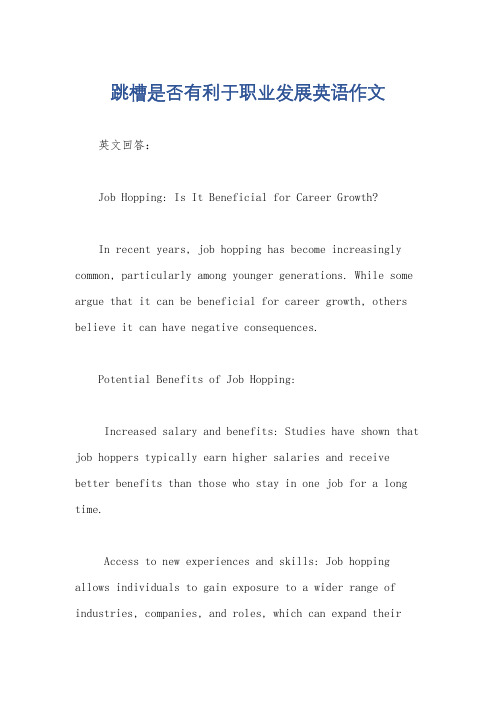
跳槽是否有利于职业发展英语作文英文回答:Job Hopping: Is It Beneficial for Career Growth?In recent years, job hopping has become increasingly common, particularly among younger generations. While some argue that it can be beneficial for career growth, others believe it can have negative consequences.Potential Benefits of Job Hopping:Increased salary and benefits: Studies have shown that job hoppers typically earn higher salaries and receive better benefits than those who stay in one job for a long time.Access to new experiences and skills: Job hopping allows individuals to gain exposure to a wider range of industries, companies, and roles, which can expand theirskillset and make them more marketable.Career advancement: Job hopping can provide opportunities for rapid career advancement, as it allows individuals to move into more senior roles more quickly.Personal growth: Job hopping can challenge individuals to step outside their comfort zones, develop new perspectives, and grow both professionally and personally.Potential Drawbacks of Job Hopping:Loss of institutional knowledge: When employees leave, they take their knowledge and experience with them. This can create a gap in institutional knowledge, which can be detrimental to companies.Negative perceptions: Job hopping can be seen negatively by some employers, who may perceive it as a lack of commitment or stability.Career setbacks: Job hopping can lead to setbacks ifindividuals are not careful in their choices. They may end up in roles that are not a good fit or that do not provide opportunities for growth.Damage to relationships: Job hopping can damage relationships with colleagues, managers, and clients, as individuals may be perceived as unreliable or disloyal.Conclusion:Whether or not job hopping is beneficial for career growth depends on individual circumstances and career goals. While it can provide numerous benefits, it is important to weigh the potential drawbacks and make informed decisions. Individuals should carefully consider their long-termcareer aspirations, their skills and experience, and thejob market before making the decision to hop jobs.中文回答:跳槽是否有利于职业发展?近年来,跳槽变得越来越普遍,尤其是在年轻一代中。
跳槽的利弊英语作文
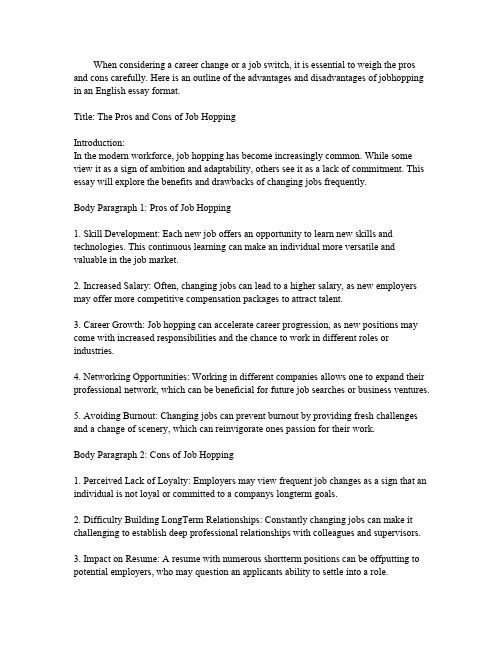
When considering a career change or a job switch,it is essential to weigh the pros and cons carefully.Here is an outline of the advantages and disadvantages of jobhopping in an English essay format.Title:The Pros and Cons of Job HoppingIntroduction:In the modern workforce,job hopping has become increasingly common.While some view it as a sign of ambition and adaptability,others see it as a lack of commitment.This essay will explore the benefits and drawbacks of changing jobs frequently.Body Paragraph1:Pros of Job Hopping1.Skill Development:Each new job offers an opportunity to learn new skills and technologies.This continuous learning can make an individual more versatile and valuable in the job market.2.Increased Salary:Often,changing jobs can lead to a higher salary,as new employers may offer more competitive compensation packages to attract talent.3.Career Growth:Job hopping can accelerate career progression,as new positions may come with increased responsibilities and the chance to work in different roles or industries.working Opportunities:Working in different companies allows one to expand their professional network,which can be beneficial for future job searches or business ventures.5.Avoiding Burnout:Changing jobs can prevent burnout by providing fresh challenges and a change of scenery,which can reinvigorate ones passion for their work.Body Paragraph2:Cons of Job Hopping1.Perceived Lack of Loyalty:Employers may view frequent job changes as a sign that an individual is not loyal or committed to a companys longterm goals.2.Difficulty Building LongTerm Relationships:Constantly changing jobs can make it challenging to establish deep professional relationships with colleagues and supervisors.3.Impact on Resume:A resume with numerous shortterm positions can be offputting to potential employers,who may question an applicants ability to settle into a role.4.Stability Issues:Job hopping can lead to a lack of job security and financial stability,as there is often a period of unemployment between positions.5.Cultural Adjustment:Each new job requires adjustment to a new company culture, which can be exhausting and timeconsuming.Conclusion:In conclusion,job hopping has both its merits and pitfalls.While it can offer opportunities for rapid skill acquisition,salary increases,and career advancement,it also comes with the risk of being perceived as uncommitted and the potential for instability. Ultimately,the decision to job hop should be made with careful consideration of ones career goals,personal circumstances,and the specific opportunities presented by each new position.。
跳槽的利弊 英文作文
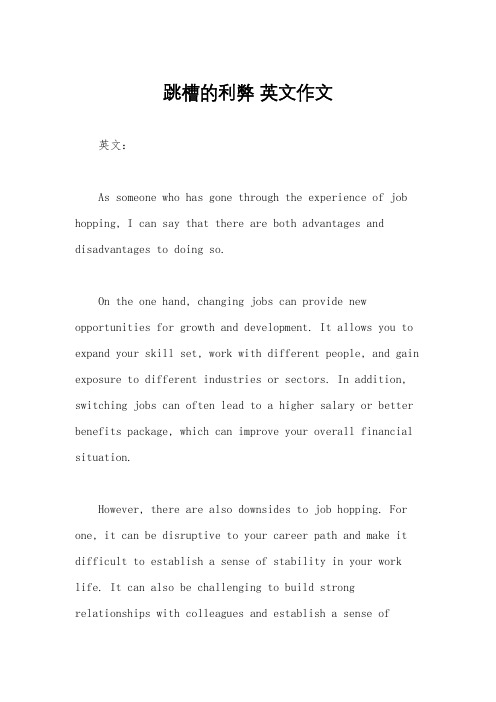
跳槽的利弊英文作文英文:As someone who has gone through the experience of job hopping, I can say that there are both advantages and disadvantages to doing so.On the one hand, changing jobs can provide new opportunities for growth and development. It allows you to expand your skill set, work with different people, and gain exposure to different industries or sectors. In addition, switching jobs can often lead to a higher salary or better benefits package, which can improve your overall financial situation.However, there are also downsides to job hopping. For one, it can be disruptive to your career path and make it difficult to establish a sense of stability in your work life. It can also be challenging to build strong relationships with colleagues and establish a sense ofloyalty to a particular company. Additionally, frequent job changes can raise red flags for potential employers, who may view you as unreliable or lacking commitment.Ultimately, the decision to change jobs should be based on a careful evaluation of your personal and professional goals, as well as the potential benefits and drawbacks of making a move.中文:作为一个经历过跳槽经历的人,我可以说,这么做有利有弊。
跳槽的优势与劣势英语作文
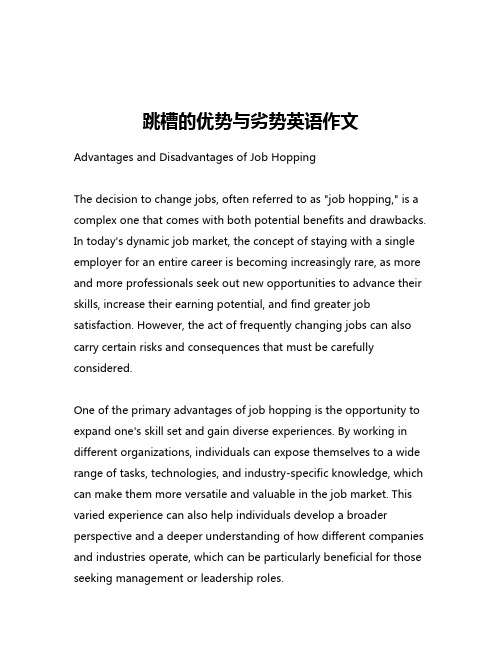
跳槽的优势与劣势英语作文Advantages and Disadvantages of Job HoppingThe decision to change jobs, often referred to as "job hopping," is a complex one that comes with both potential benefits and drawbacks. In today's dynamic job market, the concept of staying with a single employer for an entire career is becoming increasingly rare, as more and more professionals seek out new opportunities to advance their skills, increase their earning potential, and find greater job satisfaction. However, the act of frequently changing jobs can also carry certain risks and consequences that must be carefully considered.One of the primary advantages of job hopping is the opportunity to expand one's skill set and gain diverse experiences. By working in different organizations, individuals can expose themselves to a wide range of tasks, technologies, and industry-specific knowledge, which can make them more versatile and valuable in the job market. This varied experience can also help individuals develop a broader perspective and a deeper understanding of how different companies and industries operate, which can be particularly beneficial for those seeking management or leadership roles.Another advantage of job hopping is the potential for increased earning potential. When individuals change jobs, they often have the opportunity to negotiate higher salaries or more favorable compensation packages, as employers are often willing to offer competitive pay to attract top talent. This can be especially true for those who have developed specialized skills or expertise that are in high demand. Additionally, job hopping can provide a way for individuals to quickly advance their careers and reach higher levels of responsibility and compensation than they might have been able to achieve by staying with a single employer.Job hopping can also lead to greater job satisfaction and personal fulfillment. By exploring different work environments and organizational cultures, individuals can find a better fit for their values, work style, and career aspirations. This can result in increased motivation, engagement, and overall job satisfaction, which can have a positive impact on an individual's well-being and productivity.However, there are also significant drawbacks to job hopping that must be considered. One of the primary disadvantages is the potential for employers to view frequent job changes as a lack of loyalty or commitment. Some employers may be hesitant to invest time and resources in training and developing employees who they perceive as being prone to leaving the organization after a shortperiod of time. This can make it more difficult for job hoppers to secure stable employment or to advance within a particular organization.Another potential downside of job hopping is the disruption it can cause to an individual's career trajectory and professional development. Frequent job changes can make it challenging to establish a clear and coherent career path, as individuals may find themselves constantly starting over in new roles and organizations. This can make it more difficult to build a strong professional network, gain deep expertise in a particular field, or demonstrate long-term commitment to a specific career path.Job hopping can also have financial implications, as individuals may face the loss of benefits, such as retirement contributions or stock options, when they leave an organization. Additionally, the costs associated with job searches, relocation, and the potential for periods of unemployment can add up quickly, particularly for those who change jobs frequently.Finally, job hopping can also have a negative impact on an individual's work-life balance and personal relationships. The constant need to adapt to new work environments, build new professional relationships, and navigate the challenges of starting a new job can be emotionally and physically draining, leaving littletime and energy for personal pursuits and family life.In conclusion, the decision to job hop is a complex one that requires careful consideration of the potential benefits and drawbacks. While job hopping can offer opportunities for professional growth, increased earning potential, and greater job satisfaction, it also carries risks in terms of job security, career development, financial stability, and work-life balance. Ultimately, the decision to change jobs should be based on a thorough evaluation of an individual's career goals, personal circumstances, and the specific opportunities available in the job market.。
跳槽的好坏英语作文
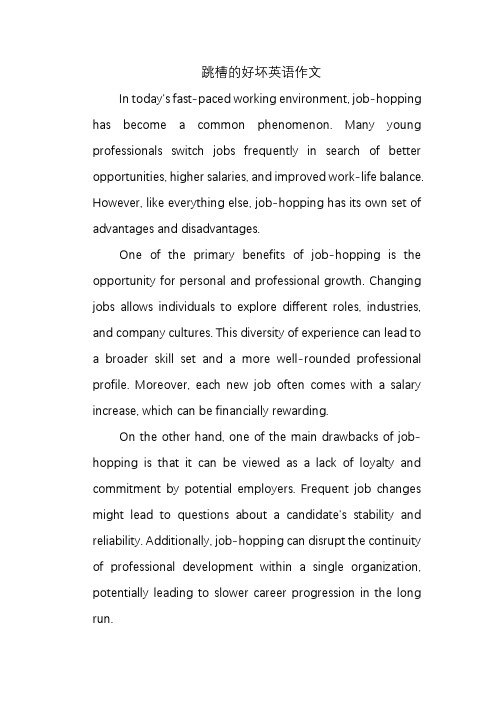
跳槽的好坏英语作文In today's fast-paced working environment, job-hopping has become a common phenomenon. Many young professionals switch jobs frequently in search of better opportunities, higher salaries, and improved work-life balance. However, like everything else, job-hopping has its own set of advantages and disadvantages.One of the primary benefits of job-hopping is the opportunity for personal and professional growth. Changing jobs allows individuals to explore different roles, industries, and company cultures. This diversity of experience can lead to a broader skill set and a more well-rounded professional profile. Moreover, each new job often comes with a salary increase, which can be financially rewarding.On the other hand, one of the main drawbacks of job-hopping is that it can be viewed as a lack of loyalty and commitment by potential employers. Frequent job changes might lead to questions about a candidate's stability and reliability. Additionally, job-hopping can disrupt the continuity of professional development within a single organization, potentially leading to slower career progression in the long run.Another advantage is that job-hopping can provide a quick escape from a toxic work environment or a dead-end job. It gives individuals the power to take control of their career paths and make decisions that align with their personal values and career goals.Yet, a potential disadvantage is that it may result in a weaker professional network. Building strong relationships with colleagues takes time, and frequent job changes can hinder the development of these important connections. Also, benefits such as pensions and long-term bonuses are often tied to the length of service, which job-hoppers might miss out on.In conclusion, job-hopping can be a double-edged sword. It offers growth, new challenges, and financial rewards, but it can also lead to perceptions of inconsistency and weakened professional networks. Therefore, individuals should weigh the pros and cons carefully before deciding to switch jobs.中文翻译:在当今快节奏的工作环境中,跳槽已成为一种常见现象。
跳槽优缺点英语作文
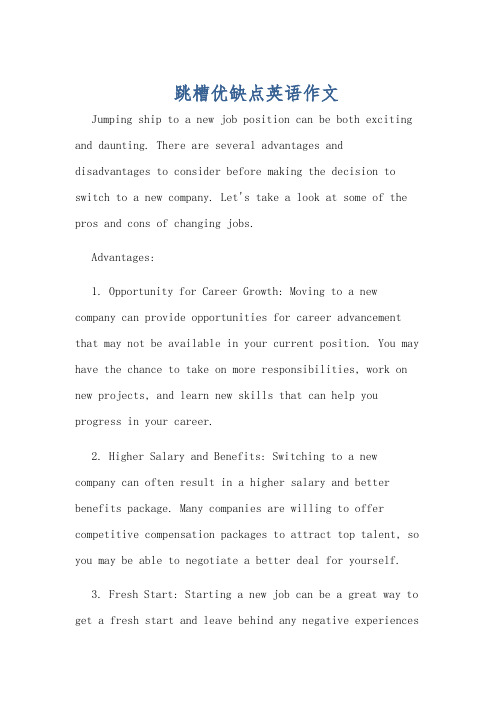
跳槽优缺点英语作文Jumping ship to a new job position can be both exciting and daunting. There are several advantages and disadvantages to consider before making the decision to switch to a new company. Let's take a look at some of the pros and cons of changing jobs.Advantages:1. Opportunity for Career Growth: Moving to a new company can provide opportunities for career advancement that may not be available in your current position. You may have the chance to take on more responsibilities, work on new projects, and learn new skills that can help you progress in your career.2. Higher Salary and Benefits: Switching to a new company can often result in a higher salary and better benefits package. Many companies are willing to offer competitive compensation packages to attract top talent, so you may be able to negotiate a better deal for yourself.3. Fresh Start: Starting a new job can be a great way to get a fresh start and leave behind any negative experiencesor challenges you may have encountered in your current role. You'll have the opportunity to make new connections, build new relationships, and create a new professional identity.4. New Challenges and Opportunities: Joining a new company can expose you to new challenges and opportunities that can help you grow professionally. You may have the chance to work on different projects, collaborate with new colleagues, and expand your skill set.Disadvantages:1. Uncertainty: Changing jobs can bring a sense of uncertainty about the new company, its culture, and the people you'll be working with. It can be challenging to adapt to a new environment and establish yourself within a different organizational structure.2. Loss of Benefits and Seniority: When you leave your current job, you may lose certain benefits such as vacation time, retirement contributions, and healthcare coverage. Additionally, you'll also have to start over in terms of seniority and building relationships within the new company.3. Adjustment Period: It takes time to adjust to a new job and get acclimated to the company's culture, policies, and procedures. You may experience a learning curve as you adapt to the new role, which can be stressful and overwhelming at times.4. Risk of Change: There's always a risk associated with making a job change. You may not have a clear understanding of what to expect in the new role, and there's apossibility that it may not meet your expectations or align with your career goals.中文:跳槽到新的工作岗位可能既令人兴奋又令人畏惧。
雅思真题范文解析:年轻人为何频繁跳槽
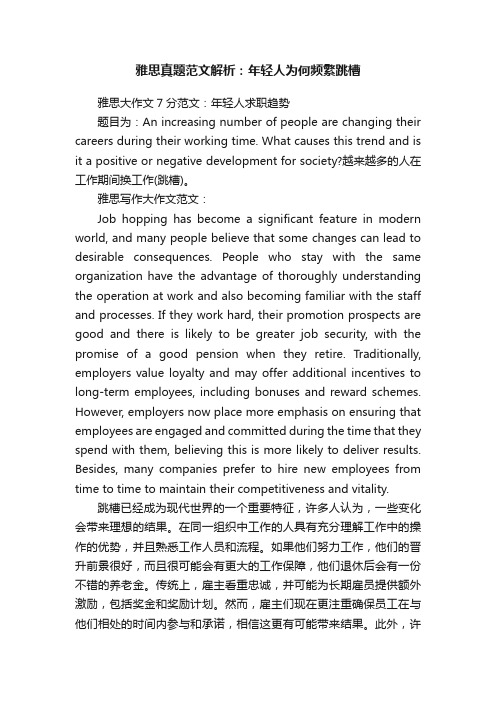
雅思真题范文解析:年轻人为何频繁跳槽雅思大作文7分范文:年轻人求职趋势题目为:An increasing number of people are changing their careers during their working time. What causes this trend and is it a positive or negative development for society?越来越多的人在工作期间换工作(跳槽)。
雅思写作大作文范文:Job hopping has become a significant feature in modern world, and many people believe that some changes can lead to desirable consequences. People who stay with the same organization have the advantage of thoroughly understanding the operation at work and also becoming familiar with the staff and processes. If they work hard, their promotion prospects are good and there is likely to be greater job security, with the promise of a good pension when they retire. Traditionally, employers value loyalty and may offer additional incentives to long-term employees, including bonuses and reward schemes. However, employers now place more emphasis on ensuring that employees are engaged and committed during the time that they spend with them, believing this is more likely to deliver results. Besides, many companies prefer to hire new employees from time to time to maintain their competitiveness and vitality.跳槽已经成为现代世界的一个重要特征,许多人认为,一些变化会带来理想的结果。
- 1、下载文档前请自行甄别文档内容的完整性,平台不提供额外的编辑、内容补充、找答案等附加服务。
- 2、"仅部分预览"的文档,不可在线预览部分如存在完整性等问题,可反馈申请退款(可完整预览的文档不适用该条件!)。
- 3、如文档侵犯您的权益,请联系客服反馈,我们会尽快为您处理(人工客服工作时间:9:00-18:30)。
雅思写作7分范文:跳槽的利与弊
导读:本文雅思写作7分范文:跳槽的利与弊,仅供参考,如果觉得很不错,欢迎点评和分享。
Some people prefer to stay in the same job for the same company, but others prefer to change jobs frequently. You should use specific reasons to compare the advantages and disadvantages of both sides
Nowadays very few people intend to go in for a life-time career. Still there are some advantages to doing so.
Merits of always taking a position can be examined by three aspects.(topic sentences) First, if you stick at taking a post, all angles of the job will have appeared; after some time,you will definitely have a good command of it. Consequently you may become a veteran of the field and earn respect or prestige from others. Second, you can establish an extensive social connections relating to the field, helping you tear down most of the barriers standing in the way of your working endeavor. Finally, mistakes of the routine tasks would be minimized because you have learned the lessons.
On the other hand, I would like to illustrate the advantages of experiencing different jobs. (topic sentence)
Initially, we look at the issue of bribery. Many high-level staff are inclined to accept bribes via power in hand. However, if he knows that someone else will soon take his place, such acts can be avoided. We then look at work motivation. If one works for the same company for a long time without promotion, he may get sick and tired of doing the same daily routine. Nonetheless, a manager should have qualities of a sense of teamwork and the capability of coordination. Therefore, to try various positions can help you gain ground to be promoted.
In summary, staying in the same post can cultivate one to cut out for the job but involve one in a boring career while changing jobs frequently can be both advantageous by keeping bribery away and providing one with more opportunities of promotion and disadvantageous by making mistakes occasionally. In my opinion, people should seek a decent and good-paid job and pay little attention to changing it.。
